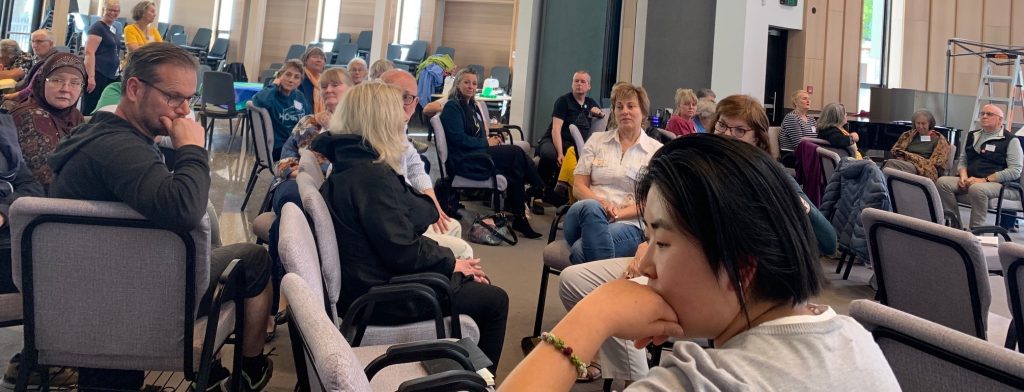In kicking off a day-long hui hosted by Aldersgate, Braided: Te Awa Whiria Conversation on Spirituality, Deirdre Carroll (Ngāi Tahu from Ngāi Tūāhiriri Marae) asked, while we know where to go to get a sticking plaster, do we know where to go to replenish the unseen spiritual element within us? Dr Lucy D’Aeth (Canterbury District Health Board and Durham Street Methodist Church) made the point that as well as the multiple intertwining ‘braids’ of spirituality between us, many of us also have multiple intertwining braids of spirituality within us.
Spiritual diversity and tolerance has a mixed history in Aotearoa New Zealand. During the Waitangi signing of Te Tiriti in 1840, debate on respect for Māori customs and authority became mixed with a dispute among the missionary churches. The French Roman Catholic Bishop, Pompallier, was concerned that the predominance of the Anglican faith amongst the British representatives and missionaries would discourage Māori from adopting Catholicism. At Pompallier’s request Governor Hobson agreed to give the assembled chiefs a guarantee by declaring that “the several faiths of England, of the Wesleyans, of Rome, and also the Māori custom, shall be alike protected by him”. Although never actually added to the text of Te Tiriti, this is sometimes referred to as an (unofficial) “fourth article”.
Despite these early guarantees of religious freedom, the Tohunga Suppression Act came into effect by 1907, as a part of a wider push for assimilation. Tohunga are traditional healers, spiritual leaders and holders of knowledge of rites, rongoā, medicinal plants and other important traditional knowledge. Although prosecution was not frequently deployed, the Act had a chilling effect on the passing on of traditional knowledge. It was not repealed until 1962.
Braided represented a deliberate effort in Ōtautahi Christchurch in 2020 to innoculate against the threat of hate and prejudice against different groups, to explore possible pathways to spiritual wellbeing, and to ‘make meaning together’. It arose out of a 2018 Women’s Spirituality Gathering in Christchurch, which itself was the 30th anniversary of the third National Ecumenical Feminist Women’s Conference. Held in Christchurch, this 1988 Conference aimed to share how women’s spirituality could empower to transform our lives and our world. The circle grew wider, and the need for Braided was spurred on with even greater urgency to have honest and inclusive conversations after the terrible 2019 mosque shootings.

Postponed twice due to the Covid lockdown and the delayed election, Braided was finally held in Aldersgate in November 2020, bringing together 80 or so participants from a wide variety of backgrounds – representing Christianity, Islam, Buddhism, traditional Māori healing & spirituality, Interfaith ministry, Atheism, Progressive Spirituality, and more.
A Panel shared their powerful stories about what spirituality means for them, and its significance:
- John Allen (Interfaith Minister)
- Aparahama Kipa (Tōhunga, Rongoā For You)
- Helene Hakaraia (Traditional Māori healer, Te Kahu Aroha Ki Waitaha)
- Sande Ramage (Spirited NZ and Spirited Crone blog)
- Dr Richard Egan (Dunedin School of Medicine, University of Otago)
- Farid Ahmed (Al-Noor Masjid)
It was also a day of creativity, ukuleles, stories, food, prayer, drawing, sewing and healing. People explored their own stories, common elements and differences, and emerging themes were identified in ‘making meaning together’. Small groups then discussed possible pathways forward for building spiritual wellbeing in our city. In the whole group this feedback was summarized, sifted and sorted into several key themes that attracted people’s interest and energy for follow up, including: creating a network of people out of this day; need for inclusive rituals, including learning to lament pain and suffering; developing ways of ethical spiritual care; and normalising spirituality in the health system.
Over the day an art installation was collectively constructed, created out of recycled materials and items people brought to contribute. The installation was called “A Place of Being”, a place where all could feel safe and at home regardless of their faith or background. It remained at the front of the Aldersgate Chapel for three weeks, coinciding with the Christian festival of Advent.
Braided created an opportunity for people to encounter others with very different world-views, in a spirit of warm acceptance, curiosity and mutual respect. Perhaps the most important outcomes of the day were that people overwhelmingly reported they felt their voice and their own spiritual story was heard, and many participants were keen to remain connected and be part of an on-going network to promote spiritual wellbeing.
The hui was made possible by a grant from the Ethnic Communities Development Fund.
More information is available at http://www.spiritednz.com/ and https://spiritualityandwellbeing.co.nz.








One response to “Braided Te Awa Whiria – Exploring spiritual wellbeing together”